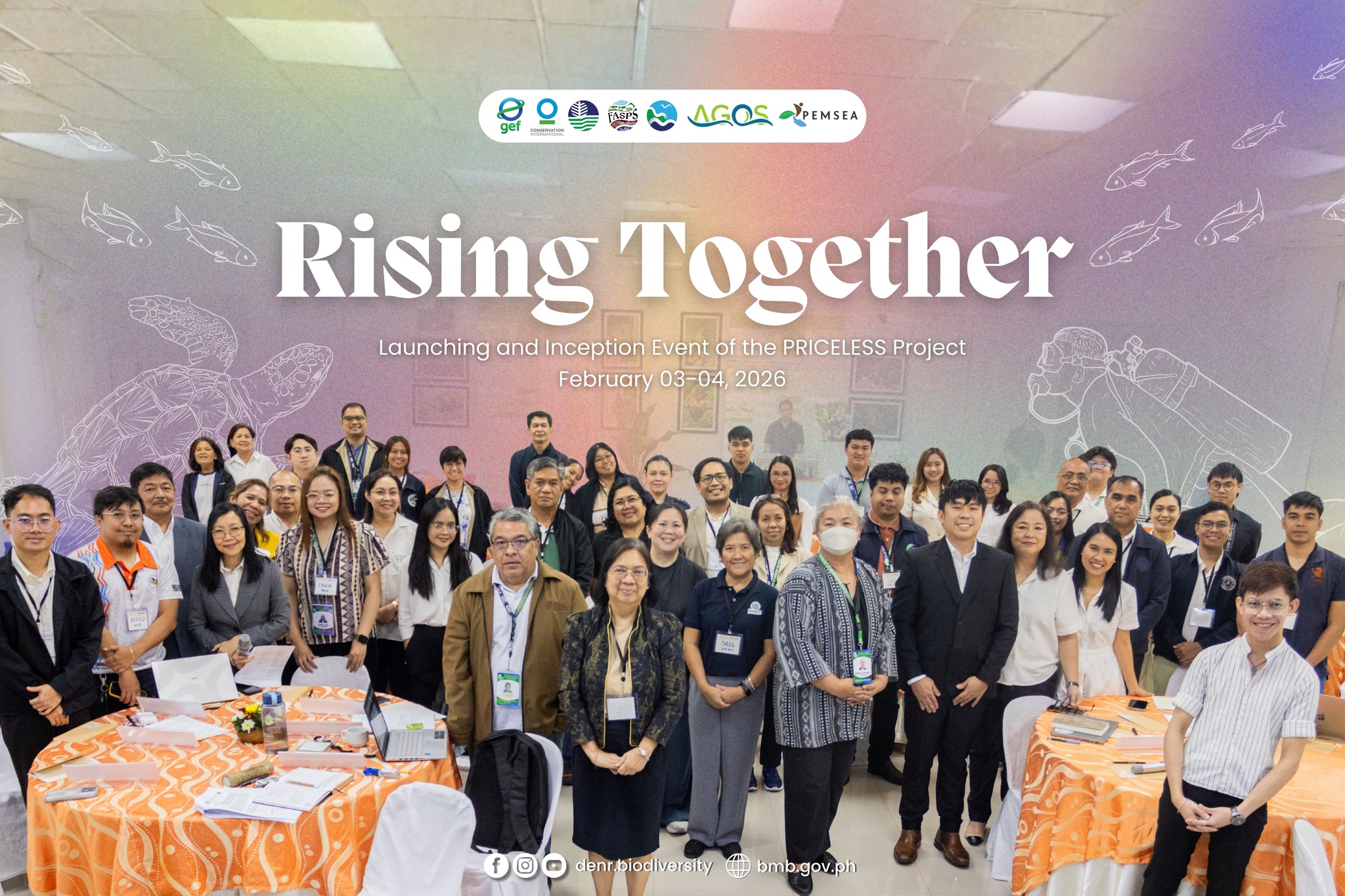7th Ministerial Forum endorses Roadmap to 2030 in support of green recovery and strengthened ocean governance in East Asia
Thursday, 2 December 2021
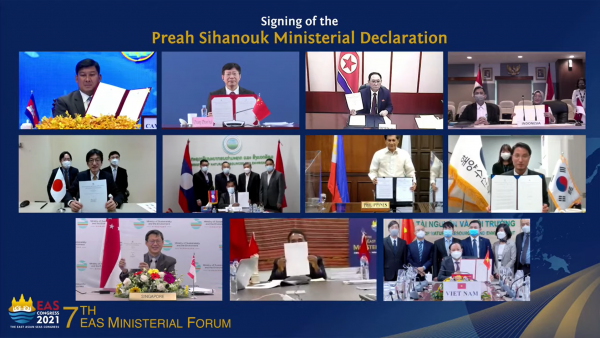
11 PEMSEA Countries sign Preah Sihanouk Ministerial Declaration
SIHANOUKVILLE, CAMBODIA— In a historic first, ministers and senior government officials from 11 countries in the East Asian Seas region gathered virtually during the 7th EAS Ministerial Forum of the 2021 East Asian Seas (EAS) Congress to pledge their commitment in advancing the United Nations Sustainable Development Goals (SDGs) via the Partnerships in Environmental Management for the Seas of East Asia (PEMSEA) Roadmap to 2030.
With the signing of the Preah Sihanouk Ministerial Declaration, the PEMSEA member countries endorsed the PEMSEA Roadmap to 2030 as the region’s decadal strategic guide anchored on the Sustainable Development Strategy for the Seas of East Asia (SDS-SEA) vision and commitment to Blue Economy, aligned with PEMSEA countries’ green recovery plans and programs, as well as with key international environmental commitments.
Themed “Advancing our Sustainable Development Agenda: Road to 2030 for Healthy Ocean, People, and Economies,” the 7th Ministerial Forum was hosted by the Royal Government of Cambodia through the Ministry of Environment, with support from the Province of Preah Sihanouk, Cambodia and co-organized with PEMSEA.
The 7th Ministerial Forum which is part of the culminating events of the East Asian Seas Congress 2021, aims to: highlight the progress made by the EAS region through the PEMSEA partnership on the implementation of the region’s common framework of action- the Sustainable Development Strategy for the Seas of East Asia (SDS-SEA); recognize the impacts as well as the opportunities to build back stronger and greener from the global pandemic, as well as other persistent and emerging concerns in the region; and launch the PEMSEA Roadmap to 2030.
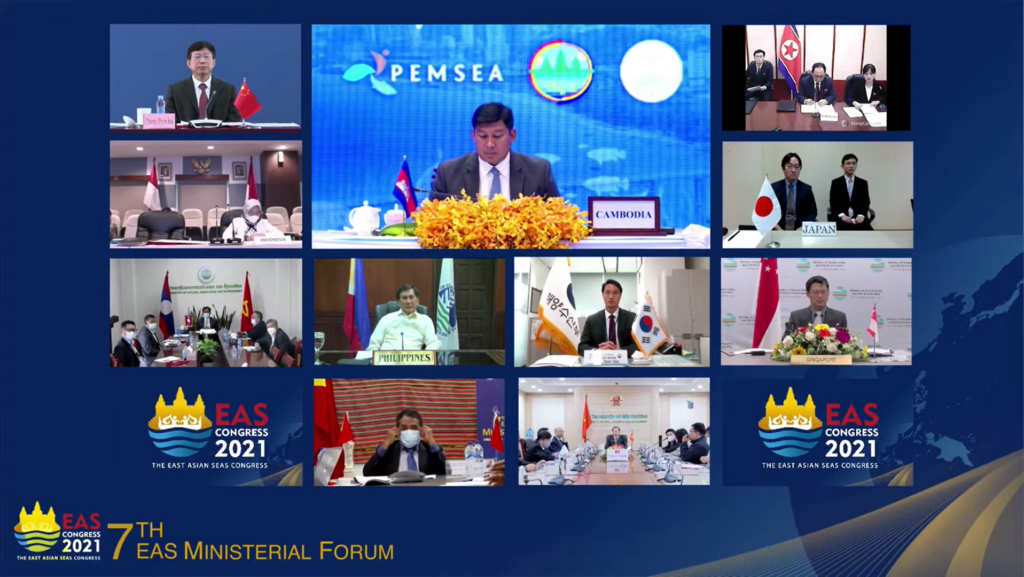
Minister Say Samal of the Ministry of Environment, Cambodia served as the event’s Chair. Senior government officials from PEMSEA’s 11 Country Partners also delivered their respective Country Statements. In attendance were:
- H.E. Sao Sopheap, Secretary of State, Ministry of Environment, The Kingdom of Cambodia
- Zhang Zhanhai, Chief Engineer and Director General, Ministry of Natural Resources, People’s Republic of China
- Ri Myong San, Vice Minister, Ministry of External Economic Relations, Democratic People’s Republic of Korea
- Mme Luckmi Purwandari, Acting Director of Coastal and Marine Pollution and Degradation Control, Ministry of Environment and Forestry, Republic of Indonesia
- Masayuki Takada, Deputy Minister for Technical Affairs, Ministry of Land, Infrastructure, Transport and Tourism, Japan
- E. Chanthanet Boualapha, Vice Minister, Ministry of Natural Resources and Environment, Lao People’s Democratic Republic
- Roy A. Cimatu, Secretary, Department of Environment and Natural Resources, Republic of the Philippines
- MOON, Seong-Hyeok, Minister, Ministry of Oceans and Fisheries, Republic of Korea
- Hazri Hassan, Director of International Policy Division, Ministry of Sustainability and the Environment, Republic of Singapore
- Acacio Guterres, Director General for Fisheries, Aquaculture and Marine Resources, Ministry of Agriculture and Fisheries, Democratic Republic of Timor-Leste
- Le Minh Ngan, Deputy Minister, Ministry of Natural Resources and Environment, Socialist Republic of Viet Nam
Minister Samal opened the Forum by stating that “today’s Ministerial Forum becomes even more crucial, as we lay down our roadmap to help the region sail through to a better tomorrow. Let us build on the lessons and gains that we have generated from PEMSEA for the last 28 years and continue the work with our ocean as one of our best assets in maintaining human and planetary health.”
Minister Samal also called on his fellow Ministers and the public to “take advantage of the opportunities arising from the pandemic and these global efforts. Cambodia, in particular, is committed to building a sustainable, equitable and resilient blue socio-economic base.” He added that “we all have a role to play to achieve our sustainable development goals and the SDS-SEA vision.”
From the countries:
Cambodia: “WITH REGARD TO GREEN DEVELOPMENT, THE ROYAL GOVERNMENT HAS BEEN CONDUCTING A COMPREHENSIVE STUDY TO FORMULATE A MASTERPLAN WITH A VISION TO TURN PREAH SIHANOUK PROVINCE INTO A MODEL, MULTI-PURPOSE SPECIAL ECONOMIC ZONE (SEZ). INCORPORATING ALL ASPECTS: ECONOMIC, SOCIAL, CULTURAL AND ENVIRONMENTAL, THE MASTERPLAN WILL FOCUS ON ECONOMIC AND INDUSTRIAL DEVELOPMENT AND INDUSTRIAL LAND MANAGEMENT, LABOR MARKETS AND VOCATIONAL TRAINING, PUBLIC FACILITIES (SUCH AS WATER, ENERGY, GAS AND SOLID WASTE), INFRASTRUCTURE AND MEANS OF TRANSPORTATION, TOURISM AND ECOLOGICAL BIODIVERSITY, LIVEABILITY AND WELLBEING, DESIGN AND URBANIZATION, LAND USE MANAGEMENT, GREEN BELT MANAGEMENT, INSTITUTIONAL FRAMEWORKS AND A FIVE-YEAR ACTION PLAN.”
CHINA: “CHINA HAS MADE MAJOR ARRANGEMENTS OF "PROMOTING GREEN DEVELOPMENT AND SEEKING THE HARMONIOUS COEXISTENCE OF MAN AND NATURE." WE ARE WILLING TO WORK HAND IN HAND WITH COUNTRIES IN THE REGION, UPHOLDING THE CONCEPT OF MARITIME COMMUNITY WITH A SHARED FUTURE.WE WOULD LIKE TO POSITIVELY DEVELOP “BLUE PARTNERSHIPS” WITH OTHER COUNTRIES, THUS CONTRIBUTING TO THE MARINE SUSTAINABLE DEVELOPMENT AND WELFARE OF THE PEOPLE IN THE REGION.”
DPR KOREA: “IN ORDER TO PROTECT THE MARINE AND COASTAL RESOURCES AND ENVIRONMENT AND ACHIEVE THEIR SUSTAINABLE DEVELOPMENT, ALL COUNTRIES IN THE EAST ASIAN SEAS SHOULD CONSTANTLY DEVELOP AND ENHANCE THEIR CAPABILITIES TO PROTECT AND MANAGE THEIR OWN MARINE AND COASTAL ENVIRONMENT. AND PEMSEA COUNTRY PARTNERS SHOULD CONTINUE TO INTENSIFY EXCHANGE AND COOPERATION BETWEEN EACH OTHER.
INDONESIA: “CONTINUOUSLY REGARDED AS A MODEL FOR STRONG REGIONAL PARTNERSHIP IN SUSTAINABLE DEVELOPMENT, PEMSEA HAS CONTINUED TO SUPPORT THE INTEGRATED COASTAL MANAGEMENT (ICM) SYNERGIZING WITH THE INTEGRATED RIVER BASIN MANAGEMENT (IRBM) SOLUTIONS IN INDONESIA, INCLUDING THROUGH THE WORK OF PEMSEA NETWORK OF LEARNING CENTRES (PNLC) AND PEMSEA NETWORK OF LOCAL GOVERNMENTS (PNLG). WE ARE PLEASED TO INFORM YOU THAT OUT OF 34 PROVINCES IN INDONESIA, 28 PROVINCES HAVE ALREADY DECLARED THEIR RESPECTIVE COASTAL AREA AND SMALL ISLANDS ZONING PLANS, COVERING ABOUT 83 % (EIGHTY THREE PERCENT) OR 90.000 (NINETY THOUSAND) KM OF INDONESIA’S COASTLINE UNDER ICM.”
JAPAN: “IT GOES WITHOUT SAYING THAT THESE OCEAN ISSUES ARE GLOBAL IN NATURE, AND THAT CONCERTED EFFORTS BY THE INTERNATIONAL COMMUNITY ARE IMPORTANT. IN ESTABLISHING THE PEMSEA ROADMAP 2030, WE BELIEVE THAT THE ROLE OF PEMSEA IS IMPORTANT IN INTEGRATING GLOBAL EFFORTS INTO FEASIBLE EFFORTS TAILORED TO THE CHARACTERISTICS OF EACH REGION ALONG WITH THE UNITED NATIONS' EFFORTS TOWARD SUSTAINABLE DEVELOPMENT. WE BELIEVE THAT IT IS MORE MEANINGFUL FOR JAPAN, AN ISLAND NATION THAT CONNECTS TO THE WORLD THROUGH THE SEA, TO ADDRESS THESE ISSUES IN COOPERATION WITH OTHER COUNTRIES.”
LAO PDR: “IN THE REGIONAL CONTEXT, LAO PDR HAS COOPERATED WITH OTHER REGIONAL AND INTERNATIONAL ORGANIZATIONS TO JOINTLY MANAGE AND DEVELOP WATER AND RELATED RESOURCES IN THE REGION, AMONG OTHER, IMPLEMENTING AND UPSCALING THE MEKONG-INTEGRATED WATER RESOURCES MANAGEMENT PROGRAM (M-IWRMP), THE TEN-YEAR STRATEGIC FRAMEWORK OF THE GREATER MEKONG SUB-REGIONAL ECONOMIC COOPERATION PROGRAM, JOINTLY FORMULATE THE IWRM-BASED BASIN DEVELOPMENT STRATEGY OF THE LOWER MEKONG RIVER BASIN 2021-2030, AND THE ASEAN STRATEGIC PLAN OF ACTION FOR WATER RESOURCES MANAGEMENT. IN ADDITION, LAO PDR HAS BEEN SELECTED AS THE CHAIR OF THE ASEAN WATER WORKING GROUP FOR 2020-2022 AND THE GLOBAL WATER PARTNERSHIP FOR SOUTHEAST ASIA (GWP-SEA) FROM 2019 TO 2021. THIS IS THE GREAT EXAMPLE OF THE LAO PDR IN FACILITATING AND ENHANCING THE COOPERATION IN THE REGION WITH REGARD TO INTEGRATED WATER RESOURCE MANAGEMENT.”
PHILIPPINES: "IN THIS 7TH MINISTERIAL FORUM, THE PHILIPPINES NOT ONLY REITERATES ITS FIRM COMMITMENT TO THE IMPLEMENTATION OF THE PEMSEA ROADMAP 2030, AND THE SDS-SEA IMPLEMENTATION PLAN 2022 TO 2027 BUT ALSO URGE ALL COUNTRY PARTNERS TO EMBRACE THE PREAH SIHANOUK MINISTERIAL DECLARATION ON BUILDING COASTAL RESILIENCE TO CLIMATE CHANGE IMPACTS IN EAST ASIA AND TO CONTRIBUTE IN ADVANCING THE GLOBAL SUSTAINABLE DEVELOPMENT AGENDA.”
RO KOREA: "“THE KOREAN GOVERNMENT HAS ENHANCED OUR SOLIDARITY WITH THE INTERNATIONAL COMMUNITY FOR COMBATING CLIMATE CHANGE, AND ACHIEVING THE SDGS VIA 2021 P4G SEOUL SUMMIT THIS YEAR. THE P4G SUMMIT IN MAY SUCCEEDED IN SOUNDING THE ALARM FOR THE ENTIRE WORLD THAT MARINE LITTER ISSUES MUST BE RESOLVED PROMPTLY AND EFFICIENTLY IN ORDER TO ENSURE THE SUSTAINABILITY OF THE OCEAN. IN THAT SUMMIT, KOREA ALSO SIGNED AN MOU WITH PEMSEA TO LAUNCH THE “EAST ASIAN SEAS INITIATIVE ON CLEAN OCEANS” AIMED AT SEEKING CIVIL SOCIETY-BASED SOLUTIONS FOR MARINE LITTER IN EAST ASIA.”
SINGAPORE: “SINGAPORE HAS ADOPTED AND WILL CONTINUE TO PROMOTE THE INTEGRATED URBAN COASTAL MANAGEMENT (IUCM) FRAMEWORK: A PROACTIVE PLANNING AND MANAGEMENT FRAMEWORK FOR SUSTAINABLE DEVELOPMENT OF THE MARINE AND COASTAL AREAS IN AN URBAN CONTEXT. IT IS A DYNAMIC AND ITERATIVE PROCESS BASED ON ESTABLISHING CONTINUOUS BASELINES AND FEEDBACK LOOPS TO FLEXIBLY ADDRESS AND COPE WITH THE INHERENT COMPLEXITY OF COASTAL AND MARINE ENVIRONMENT ISSUES IN AN URBAN SETTING.”
TIMOR-LESTE: “FOR MORE THAN 15 YEARS OF BEING A PEMSEA COUNTRY PARTNER, WE HAVE DEMONSTRATED AND BENEFITED FROM THE STRATEGIC, INTEGRATED, AND VISION-ORIENTED APPROACH OF PEMSEA. THE SDS-SEA AND ICM PROGRAMS DEMONSTRATED APPROACHES FOR COLLABORATIVE AND STRATEGIC PLANNING, AND CAPACITY AND PARTNERSHIP BUILDING AT THE REGIONAL, NATIONAL AND LOCAL LEVELS. THUS FAR, ICM PROGRAMS HAVE BEEN INITIATED IN THE MUNICIPALITIES OF DILI, MANATUTO, AND LIQUICA, WHICH COVER 30.34 PERCENT OF THE COUNTRY’S COASTLINE. THESE THREE MUNICIPALITIES HAVE ESTABLISHED MULTI-AGENCY ICM TASK TEAMS AND DEVELOPED THEIR RESPECTIVE COASTAL STRATEGIES, WHICH COULD SERVE AS GUIDE IN LOCAL PLANNING AS ADMINISTRATIVE DECENTRALIZATION PROGRESSES.”
VIET NAM: “VIETNAM HAS SUCCESSFULLY IMPLEMENTED THE SDS-SEA, SPECIFICALLY: REPLICATION OF ICZM IN COASTAL PROVINCES; PROMULGATE AND IMPLEMENT THE STRATEGY FOR INTEGRATED COASTAL ZONE MANAGEMENT TO 2020, WITH A VISION TO 2030; PROMULGATE THE LAW ON MARINE AND ISLAND RESOURCES AND ENVIRONMENT; DEVELOP AND PUBLISH THE NATIONAL REPORT ON THE STATE OF OCEANS AND COASTS 2018: BLUE ECONOMY GROWTH; NATIONAL REPORT ON THE STATE OF SEA AND ISLAND FOR THE PERIOD 2016-2020; REPORTS ON THE CURRENT STATE OF COASTAL AREAS AT THE PROVINCIAL LEVEL; ESTABLISH NATIONAL AND LOCAL MULTI-SECTORAL COORDINATION MECHANISMS IN THE IMPLEMENTATION OF COASTAL AND MARINE ECONOMIC DEVELOPMENT; INTEGRATING CONTENT ON COASTAL AND MARINE MANAGEMENT, CLIMATE CHANGE, AND RISK ASSESSMENT INTO UNDERGRADUATE AND GRADUATE TRAINING PROGRAMS.”
Key elements of the Preah Sihanouk Ministerial Declaration
The 7th EAS Ministerial Declaration outlines the following commitments:
- Reaffirm and build on the region’s previous Ministerial Declarations or commitments in support of the SDS-SEA implementation and key international agreements.
- Recognize the impact and opportunities of the global pandemic.
- Highlight the region’s progress through PEMSEA partnership and collaborative platform and PEMSEA’s key competencies (completion of Regional State of Oceans and Coasts and ten National SOC reports on Blue Economy; scaled up of integrated coastal management (ICM) covering an estimated 40 percent of the region’s coastline and contiguous watershed areas; facilitated formulation, adoption, and implementation of policies, action plans and programs on coastal, rivers, associated watershed areas and ocean ecosystems).
- Recognize the persistent and emerging challenges in the region and need for continuing regional cooperation and action.
- Endorse the development of the PEMSEA Roadmap to 2030 and SDS-SEA Implementation Plan 2023-2027, which are guided by key strategic objectives/priorities on Healthy Ocean, People, and Economies.
A regional call for action to build back better from the impacts of the global pandemic through strengthened partnership towards a responsible and strengthened ocean governance anchored on sustainable development and blue economy principles.
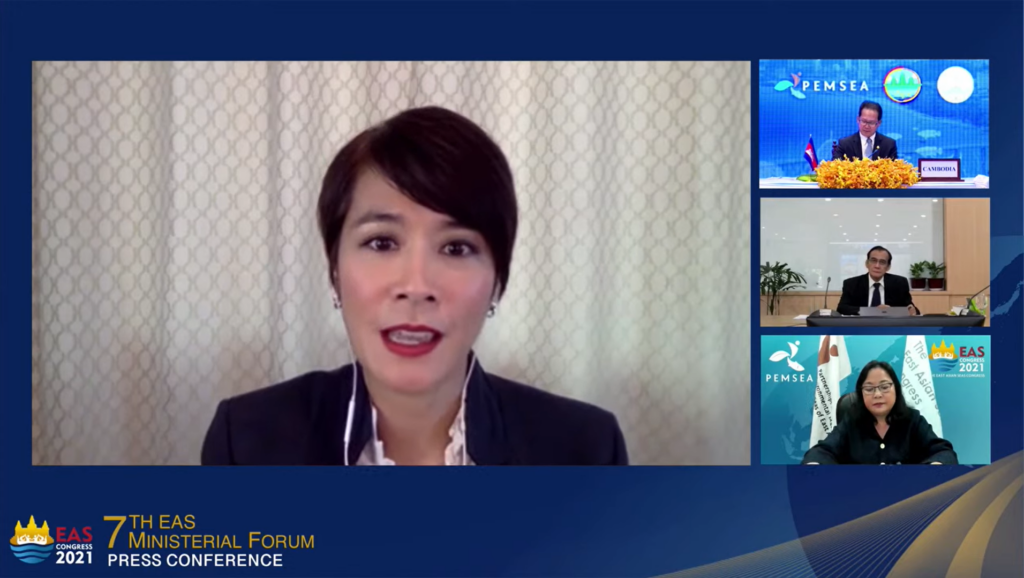
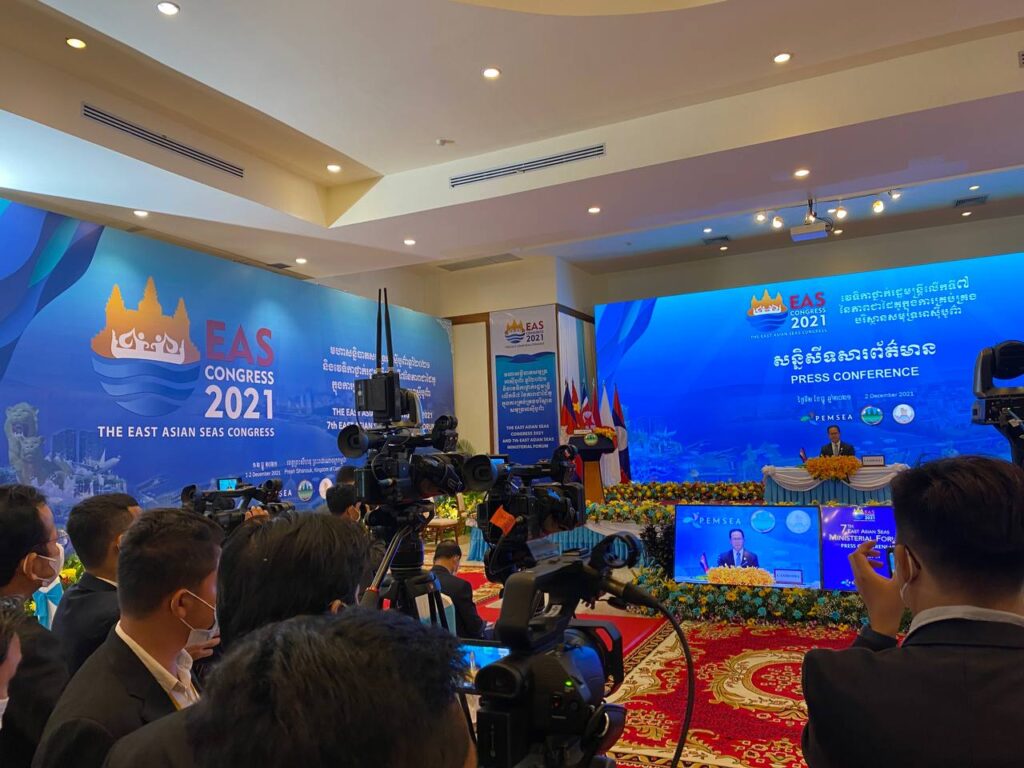
During the press conference following the Ministerial Forum, PEMSEA Executive Director Ms. Aimee Gonzales, said that the Preah Sihanouk Ministerial Declaration “supports the launching of the PEMSEA Roadmap to 2030 that is anchored on the SDS-SEA vision, the commitment to blue economy, and overall sustainable development agenda.”
She added that the Declaration “provides an inflection point in addressing the many challenges, as well as opportunities, we all need to undertake towards a full recovery. We laud the commitments made by our Country Partners despite the pandemic, even as they are in the midst of their own economic recovery programs.”
Ms. Gonzales also called on the media’s support to help spur government officials, policymakers, private sector, financial institutions and ordinary citizens into collective action.
ABOUT THE MINISTERIAL FORUM
The 7th EAS Ministerial Forum is the high-level event of the triennial East Asian Seas Congress that serves as an opportunity for concerned government ministers of the region to meet and engage in policy dialogue. It provides direction pertaining to key concerns for regional cooperation and the fulfillment of their international commitments to sustainable development through the SDS-SEA.
ABOUT THE MINISTERIAL DECLARATION
The Preah Sihanouk Ministerial Declaration signed on 02 December 2021 reaffirms commitments previously made in previous Ministerial Forums such as: (Putrajaya, Malaysia 2003) working towards sustainable development of the region’s coasts and oceans under the Sustainable Development Strategy for the Seas of East Asia (SDS-SEA); (Haikou, PR China, 2006) on establishing PEMSEA’s operating and coordinating mechanisms; (Manila, Philippines, 2009) strengthening the implementation of ICM for sustainable development and climate change adaptation; (Changwon, RO Korea, 2012) on moving towards an ocean-based blue economy; (Da Nang, Viet Nam, 2015) on aligning the region’s strategies in the SDS-SEA with global goals and targets; and (Iloilo, Philippines, 2018) on reaffirming commitments to 2021 targets.
For more information, visit: https://dev-pemseaorg.pantheonsite.io/eas-congress

